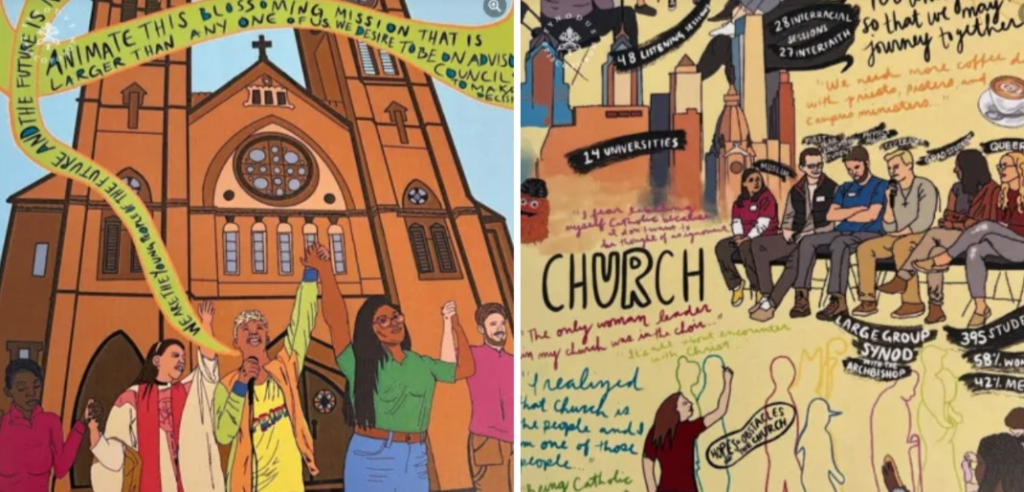Synod on Synodality: What’s going on here?

Courtesy of Catholic News Agency and Catholic News Agency
By Anthony Dryden
This is an independently submitted op-ed for our Quill section. Views and statements made in this article do not necessarily reflect the opinions of The Tower.
When one thinks of “Synod on Synodality” what comes to mind? I’d wager a bet that, to most lay Catholics, not much. There may have been some passing mention of the synod which you recall. Or perhaps you may know exactly what the synod is and have strong opinions on it.
The USCCB defines the Synod as “A two-year process of listening and dialogue beginning with a solemn opening in Rome on October 9 and 10, 2021” and that “By journeying together and reflecting together on the journey that has been made, the Church will be able to learn through Her experience which processes can help Her to live communion, to achieve participation, to open Herself to mission.”
The Synod has been going on for a year now, so why is it so obscure? Although the pandemic is blamed for many things (perhaps too widely), a Religion Unplugged article suggests, “It was in March 2020, on the eve of the pandemic, that Pope Francis announced the synod. It was quickly forgotten as the world battled the outbreak”. Now that the pandemic has waned, the Synod has come more into the spotlight.
A Synod function in Philadelphia has come under recent criticism. The two photos shown above came out of the Philadelphia synod function. The criticism I find the most fascinating is in regard to the photo on the right. In this photo we see several people seated and labeled. There is more than meets the eye here. Some participants of the synod function are sounding alarms. “Organizers are now taking seriously some students’ objections that the art mislabels their images and misrepresents their professed Catholic faith.” Now the synod function in question was a “listening session” where students of the “Philadelphia–area Catholic university” were invited to participate in.
One student who stood up for the students represented stated, “The artist depicted four out of five of us with false identities seemingly to fit a more inclusive and skewed agenda.” It is also quite disturbing that according to the student, the woman next to him “Was drawn with her real-life features, except she was drawn as a person of color and labeled as a graduate student, when she is a white undergraduate student.” As well as “The woman next to her was labeled as queer, but she is a heterosexual woman.”
It seems to me as if the Synod function in Philadelphia is trying to present something that is not happening, trying to force their wants. Now, this may seem like a harsh judgment, but let me explain. In regards to the Philadelphia controversy, Maureen O’Connel, a spokesperson for the synod organizers stated that they were, “Alarmed and upset.” Nonetheless, O’Connel goes on to state (in regards to the synodal function), “This isn’t about articulating truths.”
What this leads me to believe is that the Synod function in Philadelphia has certain themes they wish to present as prevalent, and they will do so no matter what the reality on the ground actually is. This precedent does not seem to be only limited to Philadelphia. In Germany, the Der Synodale Weg (The Synodal Way) has been going on since 2019. While not a part of the Synod on Synodality, I believe that it is emblematic of it. The German Synodal Way pushes certain themes that they believe will “regain trust lost after the abuse scandal.” However, the leaders of this Synodal Way do not seem to listen when it is learned that “only 19 percent of Catholics [in Germany] agreed with the statement that the Synodal Way was of interest to them.”
It is not only the German people who express their hesitation. The Holy See put out a statement clarifying that “the ‘Synodal Path’ in Germany does not have the faculty to oblige bishops and the faithful to assume new forms of governance and new approaches to doctrine and morals” The Holy See was prompted in making this statement to the worry that the “refusal of the Synodal Assembly to rule out decisions that run counter to Catholic doctrines” may cause strife within the Church.
It is my concern that the German attitude of disregard for the people and Church doctrine is starting to spread its way to the Synod on Synodality, particularly to the functions here in the States. The Synod on Synodality does not end till 2023, so there is still some time to see how things pan out. In the meantime prayer and knowledge of God’s steadfast love of us is never a bad idea.





